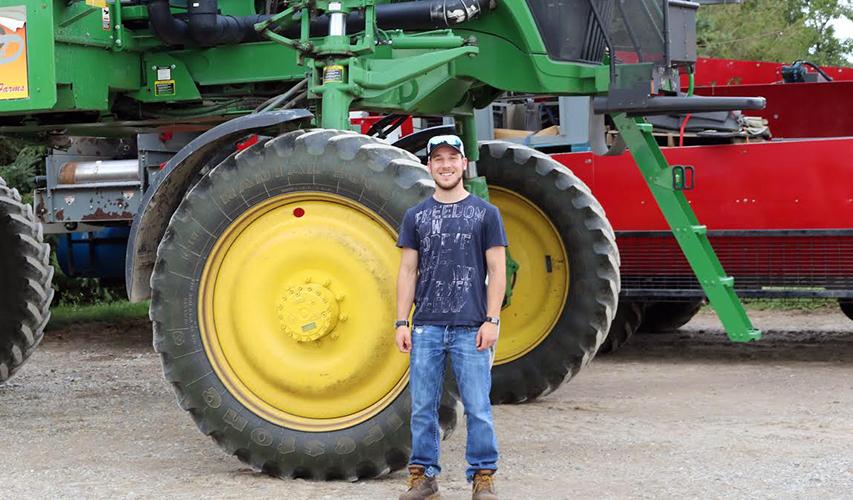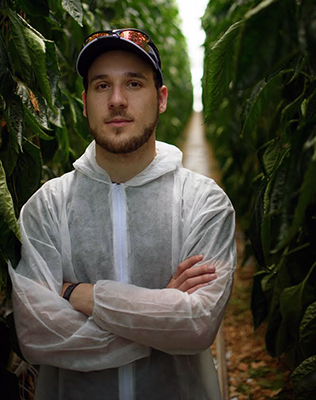Food & Agricultural Business student wants consumers to understand how food gets to their plates

While some kids dreamt of becoming a fireman or policeman, Dylan knew he wanted to be a farmer. But growing up in a city, Dylan saw first-hand the misconceptions that people had about farming. While in the Bachelor of Commerce, Food and Agricultural Business program, he learned how the business of farming truly worked and realized that farmers need a voice to communicate to the broader public about where their food comes from. That’s when the planning for his documentary, Before the Plate, first began. He recently submitted the film to the Toronto International Film Festival and has aspirations of it landing on Netflix.
In this Q&A, Dylan discusses what inspired him to create his documentary and what he hopes the documentary will accomplish.
Name: Dylan Sher
Hometown: Richmond Hill, ON
Program/Major: BComm, Food and Agricultural Business
Why did you choose U of G for a Bachelor of Commerce in Food and Agricultural Business?
When I was a little kid, I told my parents that I wanted to be a farmer. They looked at me as if I was crazy, since no one in my family had anything to do with agriculture. My parents told me I had to go to school and they said that the University of Guelph was the place to go if I wanted to "learn how to be a farmer". After looking into the U of G, it quickly became the only school that I wanted to apply to and I applied for the Bachelor of Commerce program with a major in Food and Agricultural Business.
What was your favourite course during your BComm?
My favourite course during the program was Agricultural and Food Policy, which looked at the analysis of agricultural income, marketing, adjustment and trade problems. I also enjoyed Accounting, which assisted with understanding cost determination, cost control, budgeting, capital investment and other accounting topics.
What is your goal with Before the Plate documentary?
The concept for Before the Plate started from one post on Instagram, which was a response to a negative video that I saw while I was working on a dairy farm. I had hoped that by posting my response, I could try and help explain it to my friends from the city back home. Almost two years later and a lot of imagination, this response has grown into a full 90-minute feature length documentary that has been submitted to the 2018 Toronto International Film Festival.

What do you hope to inspire through this medium?
It is my hope that people will enjoy the experience of following their food back to where it came from and provide a complete picture of what our modern food system looks like, from farm to plate.
Why is this an important issue for you, and ultimately, for Canadians?
This is a huge issue. The negative view on farming is something even I grew up with. When someone grows up in the city, it is easy to point fingers and think that all the answers are as simple as they seem. As I got older and started working on different farms, I realized that I never challenged the views and opinions that I would hear growing up. I had been accepting these views and conclusions without ever having set foot on a farm or spoken to a farmer. That's when I realized there was more to the story.
This is important for all Canadians because the people who produce our food and the people who consume it every day need to be on the same page. We are facing huge challenges in our world, from climate change to political forces, and peoples buying decisions need to come with a baseline understanding of what it took to get them that food. Educating them on where their food comes from will make sure that they are not left vulnerable to making the wrong buying decisions for them and their family.
What is your hope or goal with this documentary?
Ultimately, I hope the documentary makes it onto Netflix and other streaming services. There far way too many negative stories out there that do not help people make better buying decisions. Although all sides of the story need to be carefully looked at, I feel like we are all missing some context. I hope that someone who sees a negative video about agriculture on the internet will view it critically after watching Before the Plate. I hope it will make a lot of people stop and think critically about whether what they’re seeing is the full story, before they could find themselves sharing something that does not accurately portray an entire industry and lifestyle of farmers in this country.
How did your academics/experience at U of G help develop your vision and concept for this documentary?
I made friends with lots of amazing people and I got to hear about the things real farmers were worried about. I was sure to take advantage of every opportunity I could, and I began to understand how complex our food system was. It helped me realize that it can be so easy to get caught up with marketing information that really doesn't mean a whole lot once you truly understand how food is produced. All these opportunities would not be possible without the people I met at Guelph and there is not another place in the country where I could have been exposed to so much so quickly in the industry.